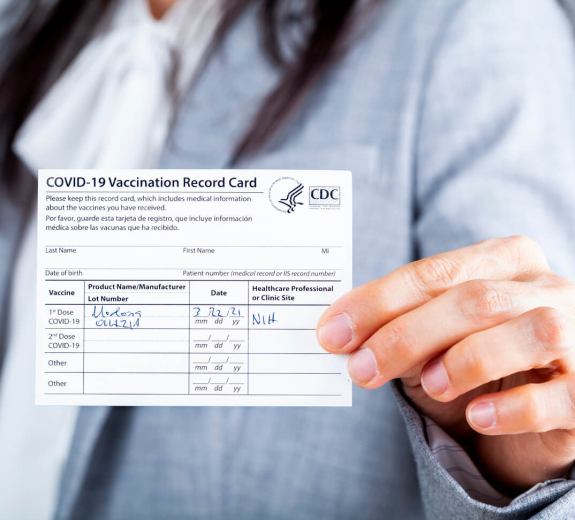
Despite Possible Side Effects, Shoot for the COVID-19 Shot
Sore arm. Fever. Body aches. We’ve all heard about the possible side effects when it comes to getting the COVID-19 vaccine – but how serious are they? And what is happening in our bodies when we feel these reactions?
BRI researchers have been hard at work studying various aspects of COVID-19 since the virus came to Washington state. BRI served as the only Pfizer vaccine clinical trial site in Western Washington, so we know a thing or two about how mRNA vaccines work.
Principal Investigator Adam Lacy-Hulbert, PhD, and Clinical Director of the Center for Interventional Immunology, Sandra M. Lord, MD, sat down to tell us about their experiences with the mRNA vaccines and the different side effects that can occur.
What are possible, common side effects for the COVID-19 vaccines?
Sandie Lord (SL): We’ve seen similar reactions for the Pfizer and Moderna vaccines, both of which are mRNA vaccines. About 75% of people report a sore arm after both the first and second shots. Additional side effects are more commonly reported after the second shot including malaise, fatigue, headaches, muscle aches, fever and chills. Be sure to get extra rest and fluids, and it’s okay to take either Tylenol or ibuprofen for symptoms. Most of these symptoms are mild or moderate and resolve in 24-48 hours.
What's the body doing that is causing the side effects in these vaccines? And why do some vaccines seem to cause stronger (or different) side effects than others?
Adam Lacy-Hulbert (ALH): The immune system is triggering the same response as it does when it encounters the COVID-19 virus. When you experience these side effects, that is a sign that the vaccine is doing what it is supposed to be doing. However, just because you don’t feel side effects doesn’t mean the vaccine doesn’t work. Everyone is different in how they respond.
SL: mRNA vaccines work differently when compared to other vaccines. They engage a killer T cell that can release a specific cytokine response.
ALH: Right. The cytokines alert other cells to the infection and stimulate the immune system. But they also cause other effects, like swelling and soreness at the injection site, and fever. A lot of the symptoms we associate with a virus are actually caused by our immune system fighting the virus. The mRNA vaccines give the immune system a pretty strong, quick kick and can stimulate a lot of the same responses. This is why the vaccines are so effective. But the flip side of a strong vaccine is a strong immune response.
Why do people feel more of an effect with the second mRNA dose?
ALH: With a two-shot mRNA vaccine, the first shot is priming your immune system to respond to the next instance it comes across the virus. The second shot is a booster, which gives you a stronger response and stimulates better immune memory. With other vaccines, this memory can last a lifetime. So, if you experience more severe symptoms with the second dose, it’s due to the immune system recognizing that it should attack.
Why is it so important that those who are recommended to get the vaccine, including those who have already been infected with COVID-19 in the past, receive both doses of the vaccine?
ALH: Studies show that the second dose increases the amount of antibody produced and the protective effect of the vaccine. Even in people who have been infected with SARS-CoV-2 in the past, the vaccine increases the immune response and protection. Getting both doses gives you the strongest protection and will help that protection last for longer.
Should people with autoimmune diseases such as type 1 diabetes get vaccinated?
SL: People with autoimmunity should first check with their provider before getting the vaccine, but the general recommendation is they should get vaccinated. People who are prescribed different immunotherapy medications for treatment of rheumatoid arthritis, multiple sclerosis, etc., may be advised to change the timing of their immunotherapy (i.e. hold or delay a dose) depending on when they will be vaccinated. This is not because the vaccination isn’t safe for people who are using immunotherapy, but because some immunotherapies may diminish the immune response to vaccination.
What were your personal experiences with the Pfizer vaccine?
ALH: For the first 12-18 hours my arm was sore, and the next morning I felt a strong reaction for about a day after the first shot and for a couple of days after the second shot. I felt achy and felt like I had a mild dose of the flu; it was worse for the second one.
SL: With the first shot I had a sore arm on the second day. With the second shot, I had a fever, chills and headache. But, it was a nice excuse to curl up on the couch with some Netflix!
To learn more about how COVID-19 mRNA vaccines work, check out this blog post.
Immuno-what? Hear the latest from BRI
Keep up to date on our latest research, new clinical trials and exciting publications.


